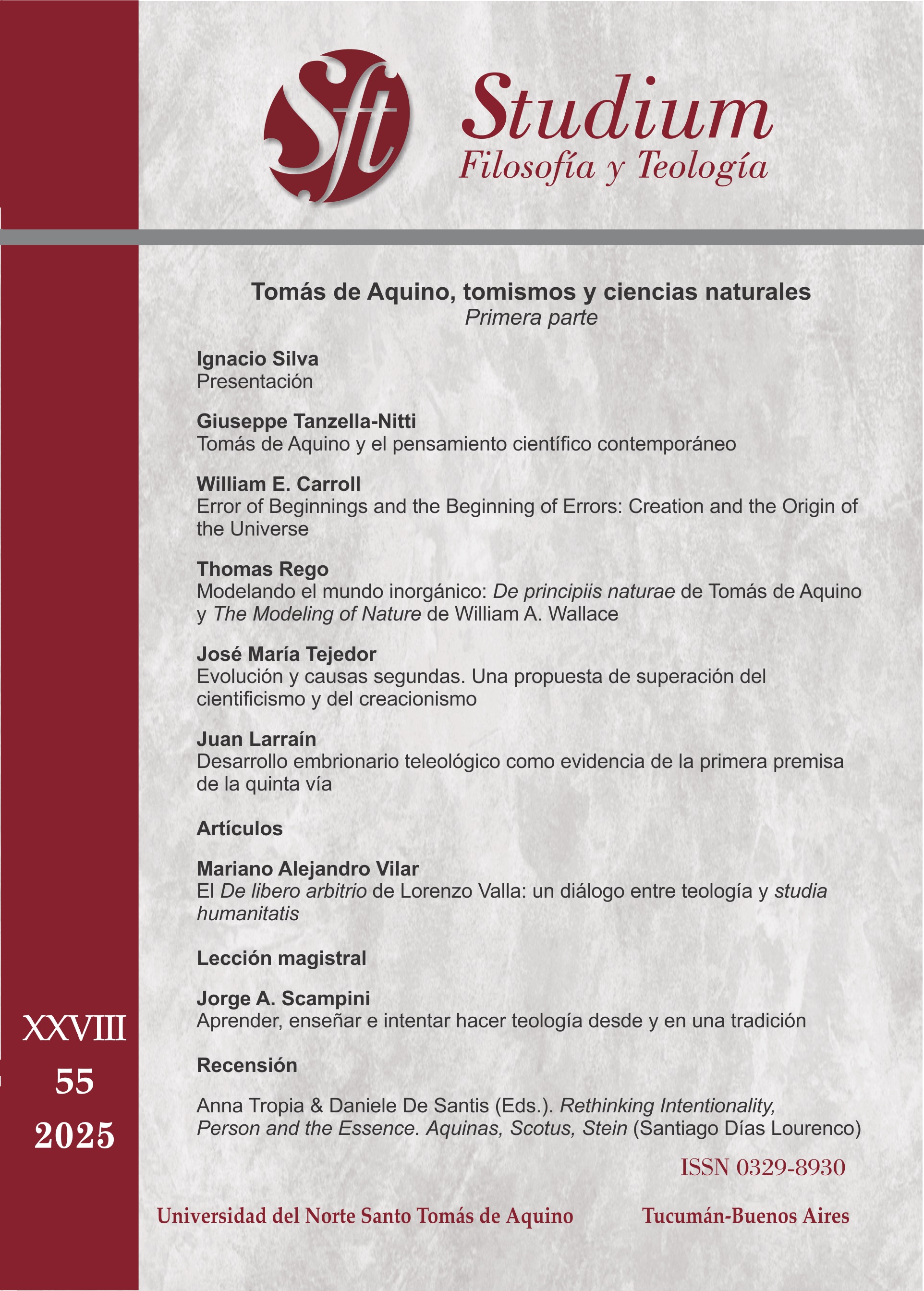Modeling the Inorganic World: De principiis naturae by Thomas Aquinas and The Modeling of Nature by William A. Wallace
DOI:
https://doi.org/10.53439/stdfyt55.28.2025.55-80Keywords:
De principiis naturae , William A. Wallace , physics, model, prime matterAbstract
We apply the fundamental concepts of Thomistic natural philosophy to the synthesis of discoveries in the natural sciences as modeled by William A. Wallace. We begin with the physical synthesis developed by Thomas Aquinas in De principiis naturae, and seek to apply the hylomorphic model to the understanding of the natural phenomena studied by the sciences. In this way, we discuss the substantial condition of atoms and their components, focusing especially on two aspects: their mode of being and the stability of this condition, while emphasizing the usefulness of an analogous consideration of material causality.
Downloads
References
Aristóteles. (1960-1970). Aristotelis Opera (I. Bekker et O. Gigon, eds.) W. de Gruyter et socios.
Ashley, B. M. (2006). The Way Toward Wisdom: An Interdisciplinary and Intercultural Introduction to Metaphysics. University of Notre Dame Press.
Bobik, J. (1998). Aquinas on Matter and Form and the Elements: A Translation and Interpretation of the De Principiis Naturae and the De Mixtione Elementorum of St. Thomas Aquinas. University of Notre Dame Press.
Borges de Meneses, R. (2001). Princípios da Natureza, de S. Tomás de Aquino. Porto Editora.
Del Prado, N. (1911). De Veritate Fundamentali Philosophiae Christianae. Ex typis Consociationis Sancti Pauli.
Feser, E. (2018). Actuality, Potentiality and Relativity’s Block Universe. In W. Simpson, R. Koons y N. Teh (Eds.), Neo-Aristotelian Perspectives on Contemporary Science. Routledge.
L. C. P., J. J. L. et Ed. (1990). Periodic Law and Table. In P. W. Goetz (Ed.), The New Encyclopædia Britannica (Vol. 15, pp. 949-955). Encyclopædia Britannica, Inc.
Lederman, L. & Teresi, D. (1993). The God Particle: If the Universe is the Answer, What is the Question? Houghton Mifflin Company.
Newton, I. (1964). Opticks. In S. Horley et J. Nichols (Eds.), Opera quae exstant omnia (Vol. 1). Friedrich Fromman Verlag.
Rego, T. (2006). Aristóteles, fuente principal del De principiis naturae. Sapientia, 61(219/220), 81-110. https://repositorio.uca.edu.ar/handle/123456789/12119
Rego, T. (2007). Causas, principios y elementos en el De principiis naturae 3 de santo Tomás de Aquino. Intus Legere Filosofía, 1(1), 11-31. https://sintesis.uai.cl/index.php/intusfilosofia/article/view/26/19
Rego, T. (2008). Materia, forma y privación en el opúsculo De principiis naturae de santo Tomás de Aquino. Sapientia, 64(224), 111-135. https://repositorio.uca.edu.ar/handle/123456789/4245
Rego, T.(2024). Identidad y unidad: analogía del ente en De principiis naturae 6 y sus fuentes. Revista chilena de estudios medievales, (25), 95-122. https://revistas.ugm.cl/index.php/rcem/article/view/624
Sacchi, M. E. (1997). Contrariedad y equilibrio en la naturaleza de las substancias materiales. Basileia.
Sacchi, M. E. (2002). El problema de la creación en la metafísica de Aristóteles: Respuesta a una crítica de Jorge Martínez Barrera. Sapientia, 57(211), 317-328. https://repositorio.uca.edu.ar/handle/123456789/12661
Tomás de Aquino. (1976). De principiis naturae. De mixtione elementorum. De ente et essentia. In Opera omnia (iussu Leonis XIII P.M. edita, vol. 43). Editori di San Tommaso.
Tomás de Aquino. (1980). Summa contra Gentiles. In R. Busa (Ed.), Opera omnia (Vol. 2). Friedrich Frommann Verlag-Günther Holzboog KG.
Torrell, J.-P. (2008). Initiation à saint Thomas d’Aquin. Sa personne et son œuvre. Academic Press Fribourg-Éditions du Cerf.
Wallace, W. A. (1996). The Modeling of Nature: Philosophy of Science and Philosophy of Nature in Synthesis. Catholic University of America Press. https://doi.org/10.2307/j.ctt3fgpqs

















